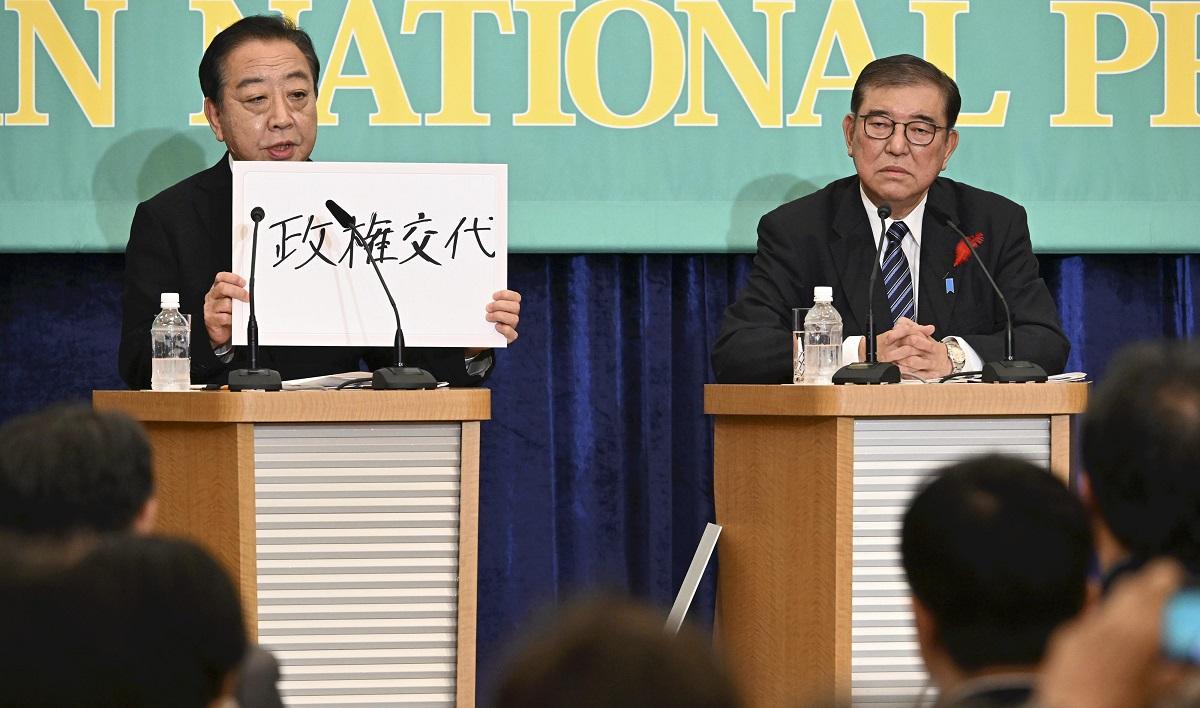CDPJ’s Noda Stresses His Pragmatism at Debate, Says Diplomacy as PM Would Center on Japan-U.S. Relationship

Yoshihiko Noda, left, president of the Constitutional Democratic Party of Japan, debates Prime Minister Shigeru Ishiba and other party leaders at the Japan National Press Club in Tokyo on Saturday.
20:00 JST, October 13, 2024
Yoshihiko Noda, the new leader of the main opposition Constitutional Democratic Party of Japan, emphasized his pragmatic approach to security and energy policies at a party leaders’ debate hosted by the Japan National Press Club on Saturday.
With the ruling Liberal Democratic Party facing headwinds amid a political funds scandal that involved some of its factions, Noda apparently aims to garner support from moderate conservatives in the upcoming House of Representatives election to be held on Oct. 27.
However, he did not make clear his stance on some issues out of consideration for left-wing members of his party.
“There is no doubt that the Japan-U.S. relationship is at the core of our diplomacy and security,” Noda said at the debate. “If our party takes power, we will handle diplomatic and security issues carefully, based on this core relationship.”
The CDPJ has pledged to remove certain clauses, those it views as unconstitutional, in security legislation that allows Japan to partially exercise the right of collective self-defense, and which also strengthens cooperation between the U.S. military and the Self-Defense Forces. Asked which clauses violate the Constitution, Noda avoided giving a clear answer. “We would re-examine what has happened since the legislation was passed,” he said.
According to the CDPJ’s platform, the party aims to “realize a zero nuclear energy dependent society,” but its campaign pledges do not include the goal.
“I am not opposed to aiming for zero nuclear power,” Noda said. “However, some people think this could be achieved quickly if we were to include it in our pledges.” He indicated the party had made a careful decision based on feasibility.
As for a refundable tax credit system that combines benefits and tax cuts, a major pillar of the party’s campaign pledges, Komeito leader Keiichi Ishii noted that the system was once considered by the Democratic Party of Japan, a predecessor to the CDPJ, when it was in power. “Then Finance Minister Jun Azumi said the system was not practical,” Ishii said.
Noda argued that such a system is “correct in that it targets only people in real need of help.” However, he admitted it was unclear how large the system would be or whom it would target. “It is true that we need to flesh out some of the details of the system going forward,” he said.
There has been persistent criticism of Noda in and outside the CDPJ due to his decision to dissolve the lower house during his time as prime minister and his handling of the government. Reflecting on his time in the premiership, Noda said his failures were due to spinning his wheels in trying to take more direct control of government and because his party did not secure the financial resources needed for its campaign pledges.
“By reflecting deeply on our past errors, we will keep from making the same mistake twice,” Noda said.
Top Articles in Politics
-

Japan PM Takaichi’s Cabinet Resigns en Masse
-

Sanae Takaichi Elected Prime Minister of Japan; Keeps All Cabinet Appointees from Previous Term
-

Japan’s Govt to Submit Road Map for Growth Strategy in March, PM Takaichi to Announce in Upcoming Policy Speech
-

LDP Wins Historic Landslide Victory
-

LDP Wins Landslide Victory, Secures Single-party Majority; Ruling Coalition with JIP Poised to Secure Over 300 seats (UPDATE 1)
JN ACCESS RANKING
-

Producer Behind Pop Group XG Arrested for Cocaine Possession
-

Japan PM Takaichi’s Cabinet Resigns en Masse
-

Japan Institute to Use Domestic Commercial Optical Lattice Clock to Set Japan Standard Time
-

Man Infected with Measles Reportedly Dined at Restaurant in Tokyo Station
-

Israeli Ambassador to Japan Speaks about Japan’s Role in the Reconstruction of Gaza





















